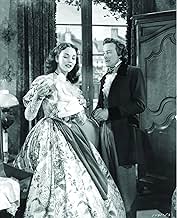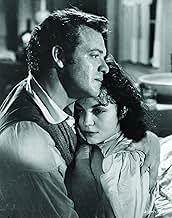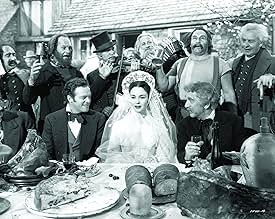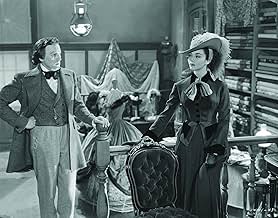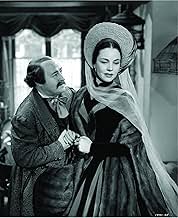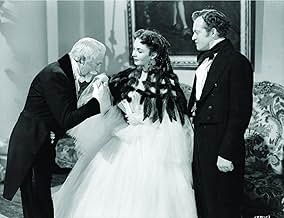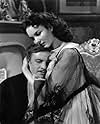IMDb रेटिंग
7.0/10
3.2 हज़ार
आपकी रेटिंग
अपनी भाषा में प्लॉट जोड़ेंA provincial doctor's wife's romantic illusions about life and social status lead her to betray her naive husband, take on lovers, and run up ruinous debts.A provincial doctor's wife's romantic illusions about life and social status lead her to betray her naive husband, take on lovers, and run up ruinous debts.A provincial doctor's wife's romantic illusions about life and social status lead her to betray her naive husband, take on lovers, and run up ruinous debts.
- 1 ऑस्कर के लिए नामांकित
- 2 जीत और कुल 1 नामांकन
Alf Kjellin
- Leon Dupuis
- (as Christopher Kent)
Harry Morgan
- Hyppolite
- (as Henry Morgan)
फ़ीचर्ड समीक्षाएं
Three versions stand out as far as Flaubert's classic is concerned:the Jean Renoir one,with Valentine Tessier,which has not worn well,the acting has become unconvincing and almost lurid when you see it today,Minelli's version and Claude Chabrol's starring Isabelle Huppert ,which doesn't avoid totally academism,despite Jean-François Balmer's portrayal of Charles that steals the show . Now for Minelli 's attempt:some have been hard on his rendition,and however,it features the best Emma ever:Jennifer Jones,the romantic heroine par excellence.Her savage beauty,looking tense,triumphs here. The supporting acts are well-chosen:Van Heflin is oafish,meek.The French Louis Jourdan is well-cast as Rodolphe Boulanger,Emma's lover who betrays her and leaves her to despair.Their final confrontation,in Boulanger's luxury mansion oozes hatred and contempt. The main drawback is the rural background:Minelli did not realize how this country life disgusted Emma:the wedding,a very very peasant one ,which Flaubert describes in lavish detail,is too short on the screen.The farms are too clean-Emma dreamed her childhood away because she could not stand the mediocrity of her milieu.She jumped out of the frying pan into the fire:a two-bit doctor,a would-be sawbones who 's totally incompetent.Van Heflin's rendering makes up for Minelli's weaknesses.The movie is sandwiched between two brief scenes of Flaubert 's trial (He was accused of immorality in his book),that's redundant.It would have been better to tell the audience about Emma's daughter's terrible fate:after the doctor's death,an orphan,she becomes a worker in a spinning mill.Supreme decay for a mother who was longing to be a socialite.
Jennifer Jones was a star I knew well from visits to the cinema with my family during the 1950's: "The Man in the Grey Flannel Suit", "The Barretts of Whimpole Street", "Love is a Many Splendored Thing" and "A Farewell to Arms".
I cut in on her at a certain stage in her career. She was a bit older than my mum, and although I liked her she didn't have the effect on a prepubescent lad that Yvette Mimieux or Tuesday Weld were having.
It wasn't until later, when we got television, that I saw the movies she made earlier in her career; "Song of Bernadette, "Duel in the Sun", "Portrait of Jennie", "Carrie" and this one: Vincente Minnelli's "Madame Bovary". What an absolute stunner she was.
Emma Bovary (Jennifer Jones) is the beautiful daughter of a poor French family, but she has an overactive imagination fostered by romantic novels.
She marries a country doctor Charles Bovary (Van Heflin) who she doesn't really love hoping to advance her standing in society and pursue her romantic dreams. However she soon outspends her husband's capacity to earn. In an era before credit cards, she maxes-out on credit notes.
Emma attracts men like moths to a flame, and cheats on her husband who still loves her despite everything. There are tears before the final fade out.
The film is bookended with the trial of Gustave Flaubert who wrote the original novel. Apparently the story so outraged the French hierarchy that they took old Gustave to court. He got off and of course the book became a bestseller.
The filmmakers used the trial to allow Gustave (James Mason) to narrate the story - quoting passages of Flaubert's prose. Although narration can be a lazy device in film, in this case, Mason's mellifluous voice puts us in the picture quickly. More importantly, Emma is seen sympathetically despite being hopelessly self-focused.
Two actors added the final touch of class to the 1949 version. Van Heflin is such a nice guy here that we are waiting for someone to smack Emma to her senses. Louis Jordan gives another variation on that smooth roué he played in "Letter to an Unknown Woman" - a not dissimilar drama.
Composer Miklos Rozsa surpassed himself with the score. With its beautiful main theme for Emma and flowing melodies it sweeps you along.
A 2014 version did away with narration. It's more low-key, but quite good with a totally different vibe to the Minnelli version. It was filmed in France and is more explicit with a fair bit of nudity. Jennifer Jones was fortunate that her movie career was in an era where she didn't have to worry about getting in shape for that kind of thing.
I cut in on her at a certain stage in her career. She was a bit older than my mum, and although I liked her she didn't have the effect on a prepubescent lad that Yvette Mimieux or Tuesday Weld were having.
It wasn't until later, when we got television, that I saw the movies she made earlier in her career; "Song of Bernadette, "Duel in the Sun", "Portrait of Jennie", "Carrie" and this one: Vincente Minnelli's "Madame Bovary". What an absolute stunner she was.
Emma Bovary (Jennifer Jones) is the beautiful daughter of a poor French family, but she has an overactive imagination fostered by romantic novels.
She marries a country doctor Charles Bovary (Van Heflin) who she doesn't really love hoping to advance her standing in society and pursue her romantic dreams. However she soon outspends her husband's capacity to earn. In an era before credit cards, she maxes-out on credit notes.
Emma attracts men like moths to a flame, and cheats on her husband who still loves her despite everything. There are tears before the final fade out.
The film is bookended with the trial of Gustave Flaubert who wrote the original novel. Apparently the story so outraged the French hierarchy that they took old Gustave to court. He got off and of course the book became a bestseller.
The filmmakers used the trial to allow Gustave (James Mason) to narrate the story - quoting passages of Flaubert's prose. Although narration can be a lazy device in film, in this case, Mason's mellifluous voice puts us in the picture quickly. More importantly, Emma is seen sympathetically despite being hopelessly self-focused.
Two actors added the final touch of class to the 1949 version. Van Heflin is such a nice guy here that we are waiting for someone to smack Emma to her senses. Louis Jordan gives another variation on that smooth roué he played in "Letter to an Unknown Woman" - a not dissimilar drama.
Composer Miklos Rozsa surpassed himself with the score. With its beautiful main theme for Emma and flowing melodies it sweeps you along.
A 2014 version did away with narration. It's more low-key, but quite good with a totally different vibe to the Minnelli version. It was filmed in France and is more explicit with a fair bit of nudity. Jennifer Jones was fortunate that her movie career was in an era where she didn't have to worry about getting in shape for that kind of thing.
Although it is several years since I saw it I can remember the beautiful photography and period setting of this not very happy story of a tormented woman.Particularly Jennifer Jones,a vastly underrated actress giving a sensitive performance which one imagined could have done with a bit more directoral guidance. Minnelli was one of those directors who seemed to give all or nothing to his projects.By his own admission he had very little interest in "Kismet" as he wanted to get it out of the way in order to start "Lust for Life" with Kirk Douglas.The lumbering manner of "Kismet" shows this to be true !! (he owed MGM one picture under his contract before starting "Lust for Life" and unfortunately for the project "Kismet" was it)Additionally Minelli did not want Jones in the lead role and one wonders how influencial David Selznick was in pushing for Jennifer once Lana Turner was unavailable for the lead.At any rate Lana had not yet developed her dramatic abilities which would lie some years ahead.Jennifer showed that she was adaptable to many moods including a few years later her scene stealing turn in "Beat the Devil" few actresses can take credit for stealing a picture away from Bogie,Peter Lorre,Robert Morley and LaLolla. Back to Madame Bovary,although the subject is a heavy one,it is well handled by Minnelli,and most reference books today regard it as a sadly neglected piece,which deserves a wider recognition.Interestingly if my memory serves me correctly Vincente barely mentions it in his autobiography.Maybe his private life at the time and his more financially successful works figure more prominantly in his memory.If I had directed Madame Bovary I would be immensly proud of it.Maybe he was.
Though I'm sure that the various French dramatizations of Madame Bovary are probably superior to this film, this English language version that MGM did in 1949 is as good as any we would have gotten from Hollywood. of that era. Jennifer Jones, Van Heflin, Louis Jourdan, and James Mason were unfortunately hampered by the Code in this version.
MGM's version incorporates the author right into his story. James Mason plays Gustave Flaubert and the film opens with him on trial for authoring indecent material as the French censors of the day saw Madame Bovary. While on the witness stand defending his work, he tells the story of his creation Emma Bovary, a girl with silly romantic notions who brings tragedy all around because of them.
Jennifer Jones is Emma and imagine Bernadette Soubirous who instead of having a divine experience has the misfortune to have other things peak her interest as an adolescent. She reads a whole lot of romantic novels who give her exaggerated notions about the nature of love.
She lives in a pretty dull town in Normandy which was also where Flaubert himself hailed from and which he satirizes in acid in this work. She marries solid, dependable Van Heflin who's a doctor and who she hopes will give her a better life.
It's in Heflin's character that the Code watered down what Flaubert was trying to say. Here he's an upright guy, a lot on the dull side, but dependable. In the novel he's as much desiring of social climbing as Jones is. In fact in the film he refuses to perform an operation that might gain him fame and success because he knows he's not qualified to do it. In the novel he does the operation and it ends in disaster all around.
Jones takes lovers Louis Jourdan and Alf Kjellin and runs up bills that put Heflin into financial disaster. All the while refusing to face the truth about life and herself.
Given the Code restrictions director Vincente Minnelli does as best as he can with his cast. James Mason makes a brilliant and erudite Flaubert on the stand. But considering he was on trial for indecency by not showing the alleged indecency to the fullest the Code defeated what could have been a classic.
MGM's version incorporates the author right into his story. James Mason plays Gustave Flaubert and the film opens with him on trial for authoring indecent material as the French censors of the day saw Madame Bovary. While on the witness stand defending his work, he tells the story of his creation Emma Bovary, a girl with silly romantic notions who brings tragedy all around because of them.
Jennifer Jones is Emma and imagine Bernadette Soubirous who instead of having a divine experience has the misfortune to have other things peak her interest as an adolescent. She reads a whole lot of romantic novels who give her exaggerated notions about the nature of love.
She lives in a pretty dull town in Normandy which was also where Flaubert himself hailed from and which he satirizes in acid in this work. She marries solid, dependable Van Heflin who's a doctor and who she hopes will give her a better life.
It's in Heflin's character that the Code watered down what Flaubert was trying to say. Here he's an upright guy, a lot on the dull side, but dependable. In the novel he's as much desiring of social climbing as Jones is. In fact in the film he refuses to perform an operation that might gain him fame and success because he knows he's not qualified to do it. In the novel he does the operation and it ends in disaster all around.
Jones takes lovers Louis Jourdan and Alf Kjellin and runs up bills that put Heflin into financial disaster. All the while refusing to face the truth about life and herself.
Given the Code restrictions director Vincente Minnelli does as best as he can with his cast. James Mason makes a brilliant and erudite Flaubert on the stand. But considering he was on trial for indecency by not showing the alleged indecency to the fullest the Code defeated what could have been a classic.
This MGM film sure sports a terrific cast--Jennifer Jones, James Mason, Van Heflin and Louis Jordan! However, no matter how good the cast and production values are, this is a film that was very, very difficult to produce in 1940s Hollywood due to the restrictions of the Production Code. This code precluded the film from fully realizing Flaubert's novel, as frank discussions of sexuality were not possible--the film never would have been cleared for public exhibition. So, the studio softened it here and there--and reduced the impact any film about this book could have had. I am sure a more modern version of the book would be quite a bit different--ad Madame Bovary's infidelities been a lot less vague.
The film begins with Dr. Bovary coming to Emma's home to treat her father. The Doctor is quite taken by her and eventually marries her--making her Madame Bovary. While quite pretty, there are some serious warning signs that went unnoticed. First, Emma was a bit childish and lived in a fantasy-sort of world where she expected real life to be like a romance novel! As a result, she's ill-equipped to deal with the boredom that comes with everyday life--as she expects constant passion, excitement and variety--not knowing even the rich and powerful live that way! Second, there is a huge disparity between the head in the clouds Emma and her rather nice but bland husband. He cannot possibly live up to her ridiculously high expectations of a man--and soon she goes searching for excitement on her own. Not surprisingly, she gravitates towards affairs, though in time, these, too, are unsatisfying--even lovers cannot always create excitement and distractions. Eventually, this leads to disaster and the story ends.
Not surprisingly, many story elements have been omitted--some due to the code and some due to the confines of a full-length film. For example, the Doctor's first marriage and significant periods in Emma's life are absent--though the spirit of the book is mostly intact.
While not exactly intended, the film seems to be an interesting portrait of what we might now consider to be a Borderline Personality or at least a person with strong Borderline traits. The inability to cope with boredom, interpersonal shallowness, the tendency to self-sabotage and craving for excitement and addiction (in this case, sexual and spending addiction) are all important hallmarks of this disorder. Such classifications were unknown in Flaubert's time, though he clearly seems to be describing such a person in Emma Bovary.
There is only one problem with such a portrait, however. Emma Bovary is in no way sympathetic--she is selfish, vain and pretty stupid. And, to make things worse, her husband is an utter fool as well, as he willfully ignores his wife's 'excesses'. As a result, it's a lovely movie to watch (it is a very glossy MGM production) but its also detached and hard to love...much like Madame Bovary herself!
The film begins with Dr. Bovary coming to Emma's home to treat her father. The Doctor is quite taken by her and eventually marries her--making her Madame Bovary. While quite pretty, there are some serious warning signs that went unnoticed. First, Emma was a bit childish and lived in a fantasy-sort of world where she expected real life to be like a romance novel! As a result, she's ill-equipped to deal with the boredom that comes with everyday life--as she expects constant passion, excitement and variety--not knowing even the rich and powerful live that way! Second, there is a huge disparity between the head in the clouds Emma and her rather nice but bland husband. He cannot possibly live up to her ridiculously high expectations of a man--and soon she goes searching for excitement on her own. Not surprisingly, she gravitates towards affairs, though in time, these, too, are unsatisfying--even lovers cannot always create excitement and distractions. Eventually, this leads to disaster and the story ends.
Not surprisingly, many story elements have been omitted--some due to the code and some due to the confines of a full-length film. For example, the Doctor's first marriage and significant periods in Emma's life are absent--though the spirit of the book is mostly intact.
While not exactly intended, the film seems to be an interesting portrait of what we might now consider to be a Borderline Personality or at least a person with strong Borderline traits. The inability to cope with boredom, interpersonal shallowness, the tendency to self-sabotage and craving for excitement and addiction (in this case, sexual and spending addiction) are all important hallmarks of this disorder. Such classifications were unknown in Flaubert's time, though he clearly seems to be describing such a person in Emma Bovary.
There is only one problem with such a portrait, however. Emma Bovary is in no way sympathetic--she is selfish, vain and pretty stupid. And, to make things worse, her husband is an utter fool as well, as he willfully ignores his wife's 'excesses'. As a result, it's a lovely movie to watch (it is a very glossy MGM production) but its also detached and hard to love...much like Madame Bovary herself!
क्या आपको पता है
- ट्रिवियाAfter the expensive box-office failure of The Pirate (1948), director Vincente Minnelli worked hard to cut corners on this film, fearing he might be accused of extravagance. However, he devoted a great deal of time to the ball sequence, which he regarded as the most important scene in the film; he even had composer Miklós Rózsa compose the waltz theme used in it well in advance of the start of filming.
- गूफ़When Madame Bovary asks Leon for money, he reacts by punching out one of the glass window panes. But on the next cut, the previously shattered window pane is now intact.
- भाव
Emma Bovary: Do you know, Charles, why that clock strikes? To announce the death of another hour.
- इसके अलावा अन्य वर्जनAlso shown in a computer colorized version.
- कनेक्शनFeatured in Some of the Best: Twenty-Five Years of Motion Picture Leadership (1949)
टॉप पसंद
रेटिंग देने के लिए साइन-इन करें और वैयक्तिकृत सुझावों के लिए वॉचलिस्ट करें
Everything New on HBO Max in August
Everything New on HBO Max in August
Looking for something different to add to your Watchlist? Take a peek at what movies and TV shows are coming to HBO Max this month.
- How long is Madame Bovary?Alexa द्वारा संचालित
विवरण
- रिलीज़ की तारीख़
- कंट्री ऑफ़ ओरिजिन
- आधिकारिक साइट
- भाषा
- इस रूप में भी जाना जाता है
- Madame Bovary und ihre Liebhaber
- फ़िल्माने की जगहें
- उत्पादन कंपनी
- IMDbPro पर और कंपनी क्रेडिट देखें
- चलने की अवधि
- 1 घं 54 मि(114 min)
- रंग
- पक्ष अनुपात
- 1.37 : 1
इस पेज में योगदान दें
किसी बदलाव का सुझाव दें या अनुपलब्ध कॉन्टेंट जोड़ें


